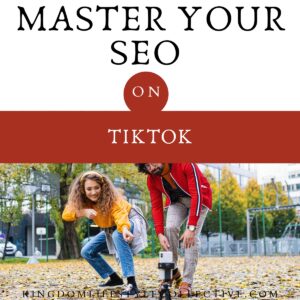Why Do You Need SEO to Maximize Profits Online?
As we venture deeper into a web-based society, the significance of an online presence for businesses continues to escalate. In 2024, the digital universe is more competitive than ever, making businesses need to leverage every tool to stand out. Among these tools, Search Engine Optimization (SEO) is not just beneficial; it’s essential.

Core Benefits of SEO and Necessity
SEO is like the secret sauce to being seen online. It’s more than just climbing to the top of search engine results—making your online presence so excellent that your ideal audience can’t help but find you. In this bit, we’ll dive into why SEO is necessary for any online biz in 2024. We’re talking about cranking up your website traffic, boosting your visibility on the internet, and, yep, raking in more page views and sales. Stick around because we’re about to break down how improving your website SEO can seriously level up your online presence.
5 Game-Changing Benefits of Quality SEO for Your Website
1. Skyrocket Your Visibility
- Be the First to Say “Hello”: With top-notch SEO, your website becomes the first hello on search engine results, making sure you’re the first click in a sea of options. The best way to grow and develop a profitable online business is to get the coveted first-page spot with a popular search term.
2. Boost Organic Traffic
- Welcome More Visitors: Quality SEO acts like a magnet, pulling in organic traffic. More eyes on your site mean more opportunities to impress and convert. This also increases your ability to monetize ads. Which, if you don’t already know, is a top way to earn passive income on your website. Top Ad Companies for Bloggers and What They Pay goes into detail about the passive income potential.
3. Build Trust and Credibility
- Earn Your Stripes: When your site ranks high, it’s like getting a nod of approval from Google. This badge of honor helps build trust with your audience, making them more likely to stick around, and it helps break down any fears that your website might be spam.
4. Enhanced User Experience
- Your Ideal Audience Who Loves Your Site Can Find It: SEO isn’t just about keywords; it’s about creating a user-friendly website. A well-optimized site that ranks high on search engines, means happy visitors who can easily find what they’re looking for, ensuring they leave with a smile. It also increases the likelihood of them returning to your website later.
5. Stay Ahead of the Competition
- Lead the Pack: Quality SEO is your jetpack in the digital race. It helps you stay ahead of your competitors and sets the pace, making you the one to catch up with. This is achieved over time because quality SEO takes time. But once your SEO is done correctly, you will continue to benefit for years.
Why Your Online Business Needs SEO Stan.Store Cannot Provide
While platforms like Stan.store offer a quick setup for online businesses, they come with inherent limitations, particularly in SEO capabilities. These platforms often restrict the extent of SEO customization, impacting your ability to optimize your online presence fully. Understanding these limitations is crucial for businesses aiming for greater digital reach. Additionally, when you have a Stan.store as opposed to your own domain, you are missing out on the benefits of ad traffic. I recommend any influencer or creator experiencing success with a Stan.store quickly transition to their own WordPress blog to avoid leaving money on the table. Everything You Need to Start a Blog gives you the steps you need to make the transition.
Control, Customization, and Credibility
A self-hosted, SEO-optimized website offers unparalleled advantages. Complete control over your website’s structure, content, and optimization strategies allows for a tailored approach to SEO. This section will discuss how such control and customization not only enhance your site’s SEO performance but also bolster its credibility and user experience.
5 Ways Quality SEO Enhances User Experience (UX) for Your Ideal Audience
1. Improved Site Navigation
- Easy to Navigate: Quality SEO optimizes your site’s structure, making it easier for your audience to find what they need quickly and efficiently. A well-structured website enhances user satisfaction and keeps them coming back.
2. Faster Load Times
- Quick Access: A key component of SEO is optimizing page load times. Faster loading pages reduce bounce rates and ensure your audience can access your content without frustrating waits, significantly improving the overall UX.
3. Relevant Content Matching
- Spot-On Content: SEO ensures that the content on your website matches what your ideal audience is searching for. By focusing on relevant keywords and topics, users are more likely to find the information they need, enhancing their experience and perception of your brand.
4. Mobile Optimization
- Seamless Mobile Experience: With the increasing use of mobile devices to access the web, SEO now includes optimizing websites for mobile. This ensures that your audience enjoys a seamless experience, whether they’re on a desktop or scrolling through their phone.
5. Increased Engagement
- Engage and Convert: By improving site navigation, speed, relevance, and accessibility, quality SEO naturally leads to higher engagement rates. Engaged users are more likely to convert, whether that means making a purchase, signing up for a newsletter, or simply spending more time exploring your content.
Why Your Online Business Needs Domain Ownership for SEO
Owning your domain is a game-changer in the world of SEO. It’s not just a URL; it’s your brand’s identity and plays a significant role in your SEO strategy. This part will explore the benefits of having a domain you own, from improved search rankings to brand recognition and trust.
3 Key Reasons Why Domain Ownership Benefits Your SEO
1. Enhanced Credibility and Trust
- Builds Authority: Owning your domain establishes a sense of credibility and trustworthiness among users and search engines alike. A custom domain signals professionalism and commitment to your brand, which can positively influence your site’s authority and, consequently, its SEO rankings.
2. Long-term Brand Recognition
- Strengthens Brand Identity: A unique and consistent domain name reinforces your brand identity, making it easier for users to remember and return to your site. Over time, this brand recognition can lead to increased organic traffic, a critical factor in SEO success. Moreover, a memorable domain name can generate word-of-mouth referrals and enhance brand loyalty.
3. Control Over Backlink Profile
- Improves Backlink Quality: Owning your domain gives you the control needed to build and maintain a healthy backlink profile, a vital component of SEO strategy. You can ensure that the links pointing to your site are of high quality and relevant to your niche, which search engines reward with higher rankings. Furthermore, a domain that you own and control is less likely to be associated with low-quality or spammy backlinks that can harm your SEO efforts.
Keeping Up with Evolving Algorithms
SEO is an ever-evolving field, with search engine algorithms constantly updating. Staying abreast of these changes and adapting your SEO strategies accordingly is vital. This section will cover the latest SEO trends and best practices in 2024, emphasizing the need for continuous learning and adaptation.
Vital SEO Best Practices in 2024
1. Mobile-First Indexing
- Prioritize Mobile Usability: With the majority of web traffic coming from mobile devices, ensuring your website is fully optimized for mobile is no longer optional. Google’s mobile-first indexing means your site’s mobile version will be considered the primary version. Focus on responsive design, mobile load times, and interactive elements that perform seamlessly on smartphones and tablets.
2. Voice Search Optimization
- Adapt to Natural Language Queries: The rise of digital assistants has made voice search optimization crucial. Incorporate long-tail keywords and conversational phrases that match the natural language users employ when speaking to their devices. Structuring content to directly answer questions can also boost your visibility in voice search results.
3. High-Quality Content Creation
- Provide Value and Relevance: Content remains king in the SEO realm. Creating in-depth, informative, and engaging content that addresses the needs and interests of your target audience is essential. Use a mix of formats, including blog posts, videos, and infographics, to deliver value and keep users engaged. Regularly updating existing content can also keep it relevant and improve rankings.
4. E-A-T Principles
- Demonstrate Expertise, Authority, and Trustworthiness: Google’s emphasis on Expertise, Authoritativeness, and Trustworthiness (E-A-T) continues to shape SEO strategies. Showcase credentials, cite reputable sources, and build a strong backlink profile to enhance your site’s authority. Transparently providing contact information and privacy policies can also boost trust.
5. Core Web Vitals
- Optimize for User Experience (UX): Google’s Core Web Vitals are set to play a significant role in SEO rankings. These metrics measure loading performance, interactivity, and visual stability of pages. Improving these aspects not only boosts your SEO but also enhances overall user satisfaction, reducing bounce rates and encouraging longer visit durations.
6. Semantic Search Optimization
- Focus on Context and Intent: Search engines are getting better at understanding context and user intent behind queries. Optimizing for semantic search involves using related keywords and covering topics in depth to provide comprehensive answers to user questions. Structured data markup can also help search engines understand the context of your content, improving its visibility in relevant searches.
Why You Need Quality Content for SEO to Matter
Content remains king in the realm of SEO. Quality, relevance, and value-driven content are at the heart of effective SEO strategies. This segment will focus on the critical role of content in attracting and retaining your audience, and how it influences your site’s SEO performance.
How Content Quality Elevates SEO
1. Boosts Engagement and User Experience
- Captivating Content Keeps Users Longer: High-quality, engaging content captures users’ attention, encouraging them to spend more time on your website. This increased dwell time signals search engines that your site provides value, potentially boosting your SEO rankings. Engaging content also enhances the overall user experience, making visitors more likely to return.
2. Increases Organic Traffic and Shares
- Share-Worthy Content Spreads Your Reach: Exceptional content is more likely to be shared across social media and linked to by other websites, generating organic traffic and valuable backlinks. These natural links are crucial for SEO, as they indicate to search engines that your content is authoritative and trustworthy, improving your site’s visibility and rankings.
3. Improves Keyword Optimization
- Strategically Embedded Keywords Attract the Right Audience: Quality content allows for the seamless integration of relevant keywords without compromising readability. By naturally incorporating keywords your target audience is searching for, you can improve your site’s SEO performance, ensuring it appears in the right search queries and attracts more qualified traffic.
4. Fosters Long-Term SEO Success
- Quality Content Remains Evergreen: High-quality content that provides timeless value continues to attract visitors long after it’s published. This evergreen content can maintain or even improve its search rankings over time, contributing to sustained SEO success and a steady stream of traffic.
Website Design and Navigation
The user experience of your website is intricately linked to its SEO performance. A well-designed website with intuitive navigation not only pleases your visitors but also ranks better in search engine results. This part will delve into the importance of user-friendly design and seamless navigation in boosting your SEO efforts.
What Are Online Business SEO Best Practices for Web Navigation and Design
1. Intuitive Navigation Structure
- Simplify User Journeys: An intuitive and well-organized navigation structure enables users to find information quickly and effortlessly. Use clear, descriptive labels for menu items and organize content logically. A streamlined navigation enhances user experience, reducing bounce rates and signaling to search engines that your website is user-friendly, which can positively impact your SEO rankings.
2. Responsive Design
- Optimize for All Devices: With the increasing use of smartphones and tablets for web browsing, having a responsive design that adjusts content layout for different screen sizes is essential. Responsive design improves usability and engagement for mobile users, aligning with Google’s mobile-first indexing strategy and boosting your SEO performance.
3. Fast Loading Speed
- Enhance Page Load Times: Speed is a crucial factor in user satisfaction and SEO rankings. Optimize images, minify CSS and JavaScript, and leverage browser caching to improve page loading times. Faster websites provide a better user experience, encouraging longer visits and improving bounce rates, which can positively influence your SEO.
4. Clear Call-to-Action (CTA) Buttons
- Guide User Actions: Prominently placed and well-designed CTA buttons guide users toward desired actions, such as subscribing to a newsletter or making a purchase. Effective CTAs can increase conversion rates and user engagement, signaling to search engines that your site is valuable to visitors.
5. Consistent and Accessible Design
- Maintain Consistency and Accessibility: Ensure your website’s design is consistent across all pages, including fonts, colors, and layout styles, to create a cohesive user experience. Additionally, adhere to web accessibility guidelines to make your site usable for people with disabilities. An accessible and cohesive design improves user engagement and can contribute to higher SEO rankings.
6. Use of Breadcrumbs
- Enhance Site Navigation: Breadcrumbs are navigational aids that show users their current location within the website hierarchy and allow easy navigation to previous pages. Implementing breadcrumbs improves site navigation, helps users understand the structure of your site, and supports search engines in categorizing your content, enhancing your SEO.
7. Optimized Visual Hierarchy
- Highlight Important Content: Employing a visual hierarchy in your web design, where important elements are more prominent, helps guide users’ attention to key information and actions. This content prioritization improves user experience and allows search engines to understand the most crucial parts of your pages, potentially improving your content’s visibility.
Measuring Success and Making Adjustments
Analytics play a crucial role in monitoring and refining your SEO strategies. By understanding and analyzing your SEO performance, you can make informed adjustments to enhance your site’s visibility and effectiveness. This part will cover essential analytics and monitoring tools for SEO. I do not personally utilize each of the tools below. However, it is necessary you utilize at least the first two free tools from Google when beginning your journey.
Why Your Online Business Needs SEO Analytics Essentials and Tools for Measuring SEO Success
Navigating the world of SEO requires not just strategic implementation but also the ability to measure and analyze the impact of your efforts. Here are key analytics essentials and tools that provide invaluable insights into your SEO success.
1. Google Analytics
- Comprehensive Website Analysis: Google Analytics is the gold standard for tracking website performance. It offers deep insights into user behavior, traffic sources, page views, and bounce rates. Understanding these metrics allows you to refine your SEO strategies, enhance user experience, and improve content engagement.
2. Google Search Console
- Search Performance and Health: Google Search Console gives you a direct look into how Google views your site. It highlights which queries bring users to your site, your site’s Google Search performance, and issues affecting your site’s visibility. It’s essential for monitoring your site’s health and optimizing your search presence.
3. SEMRush
- Competitive Analysis and Keyword Tracking: SEMRush offers a comprehensive suite for tracking keywords, analyzing competitors, and identifying opportunities for improvement. Its detailed reports on search rankings, backlink profiles, and keyword performance make it a powerful tool for strategic SEO planning.
4. Ahrefs
- Backlink Analysis and Content Exploration: Ahrefs excels in backlink analysis, providing detailed insights into your backlink profile and the quality of links. It also offers tools for keyword research, competitor analysis, and content gap analysis, helping you to craft strategies to outperform competitors.
5. Moz Pro
- SEO Insights and Optimization: Moz Pro offers a range of tools, including site audits, rank tracking, and keyword research. Its Page Optimization feature provides actionable recommendations for improving SEO performance, while Moz’s Domain Authority metric is widely used to assess a website’s potential to rank in search results.
6. Screaming Frog SEO Spider
- Website Crawling and Audit: Screaming Frog is a desktop program that crawls website URLs to analyze and audit technical and onsite SEO. It helps identify broken links, audit redirects, analyze page titles and metadata, and generate XML sitemaps, facilitating comprehensive SEO audits.
7. Hotjar
- User Behavior Insights: Hotjar complements traditional analytics tools by offering visual insights into user behavior through heatmaps, session recordings, and surveys. Understanding how users interact with your site can reveal pain points and opportunities for improving site usability and content effectiveness.
8. Google Data Studio
- Custom Reporting: Google Data Studio allows you to create custom dashboards and reports by integrating data from various sources, including Google Analytics and Google Search Console. It’s invaluable for presenting complex data in an accessible format, enabling data-driven decision-making.
Conclusion
SEO remains a cornerstone of online business success in 2024. With the right strategies, a self-hosted, SEO-optimized website, and ownership of your domain, your business can achieve remarkable visibility and growth in the digital marketplace. To begin your journey with SEO to create a more passive income, download my free passive income planner below!

















